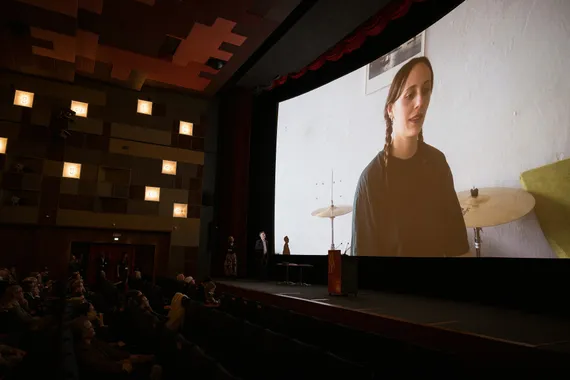
Erste Bank Film Award 2023
© Viennale

The Erste Bank Film Award, initiated and sponsored by Erste Bank, will be awarded for the 13th time in cooperation with the Viennale, the Deutsches Haus at NYU and the Anthology Film Archives.
The Erste Bank Film Award is awarded among the Austrian film productions screening in the Viennale programme via an independent jury. The Film Award enables a stay in New York City including a work presentation at the Anthology Film Archives.
Jury
Silvia Bohrn, cultural manager
Nicolas Mahler, comic artist
Boris Manner, philosopher and curator
Jed Rapfogel, film programmer Anthology Film Archives
moderated by Ruth Goubran, Erste Bank
Jury Statement
The jury of the Erste Bank Film Prize has decided to dedicate the prize to two films.
The Erste Bank Film Award goes to Martha Mechow’s for Die ängstliche Verkehrsteilnehmerin (Losing Faith)
One of the two Erste Bank Film Awards goes to Martha Mechow’s “unidentifiable film object”, Die ängstliche Verkehrsteilnehmerin (Losing Faith). Mechow’s film is that rarest of phenomena: a film that is truly exploratory, both intellectually and formally. Losing Faith is ostensibly the story of a young woman, Flippa, still bearing the scars of having been abandoned by her mother as a child, who tracks down her sister Furia in Sardinia, where she’s joined a de facto feminist commune of young women who are trying to forge identities and relationships outside the confines of conventional social structures. But the beauty of the film is that it’s genuinely a film of ideas. Cinematically, Losing Faith itself explodes conventional ideas about how films can be created and structured. Made in an intentionally unpolished and anti-naturalistic style, it fearlessly combines elements of cinema, theater, and literature: apparent improvisation, poetic language, frankly philosophical musings, unrestrained flights of fancy, and even an in-depth analysis of Jane Austen’s novels (the latter delivered by Flippa as she chews on her retainer).
But all these elements find coherence thanks to Losing Faith’s thematic seriousness: both the filmmakers and the characters are profoundly committed to rethinking received notions of social and personal relations, while the film fully confronts the difficulty of doing so in a responsible and humanistic way. At one point the (charismatic but domineering) leader of the commune proclaims, “Man, there is no plan! There are possibilities, and they have to be tested out.” This could serve as a statement of purpose on the part of the film itself. But at the same time, Losing Faith is fully aware of the dangers inherent in trying to negotiate between freedom and responsibility. It’s animated by a conviction that Western society is in desperate need of transformation, but also attuned to the possibility of falling into the trap of a solipsistic self-righteousness – a theme that cuts to the heart of our present moment.
The Erste Bank Film Award goes to Adrian Goiginger for Rickerl
In Rickerl, Adrian Goiginger portrays the everyday life of a talented and unsuccessful musician and at the same time analyses the Viennese soul. The multi-talented Voodoo Jürgens skilfully embodies the main character in this film, which also interweaves biographical elements of the singer-songwriter. The protagonist's dreary everyday life between the job centre and layoffs is only made bearable by visits from his son, who lives apart from him, and a cheerful get-together in his local pub. In this comedy, Goiginger succeeds in developing the image of a typical Viennese character without falling into clichés. Oscillating between a longing for death and creative inspiration, he stumbles over himself again and again just before reaching his goal.
The film touches us with its authentic portrayal of the main character, takes an ethnological look at the Viennese suburban milieu and shows it as a declining culture.